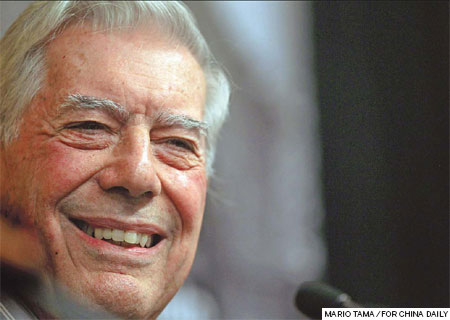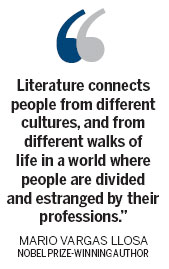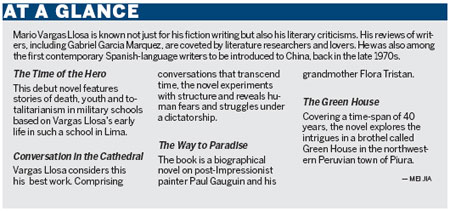Pen mightier than the sword


Literature should be a bit detached from the current political situation, says Peruvian-Spanish writer Mario Vargas Llosa, who is hugely popular among Chinese readers for his ability to combine artistry with a reflection of the social reality. Mei Jia reports.
He's been called "teacher of Chinese writers" by literary critic Bai Ye. And he's caught the attention of Chinese readers as much for his works, as his legendary campaign for the presidency of Peru, and his much-publicized feud with fellow Nobel laureate Gabriel Garcia Marquez. Peruvian-Spanish writer Mario Vargas Llosa was in Beijing recently at the invitation of the Chinese Academy of Social Sciences and the Cervantes Institute. Before his Beijing tour, where he gave a speech entitled A Writer's Testimony at a gathering of more than 1,000 students, diplomats, scholars, writers and literature lovers on June 17, he addressed students at the Shanghai International Studies University, which named him an honorary professor.
In Beijing, Bai told Vargas Llosa that he had no idea just how loved and well-known he is in China.
"When I heard the news of your visit, I happened to be traveling with several writers," Bai told him. "I found that every writer there had read at least three of your works."
Carrying a well-thumbed copy of his book, Captain Pantoja and the Special Service, she had bought in the 1980s, writer Xu Xiaobin, 58, who attended the forum later that day, says, "The state of this book can tell you how many times I have read it.
"I still remember my excitement as a young writer on discovering a novel could be written like this. The plot and dialogue are mere clues, allowing readers to construct the story."
Xu is among the numerous Chinese readers and writers who fell for the charm of Latin American literature in the 1980s and 90s.
Vargas Llosa's visit has renewed interest in the kind of writing that balances artistic pursuits with a reflection of the social reality, for which the writer is famous.

News of his visit triggered a flurry of activity in Chinese literary circles with publishers discussing his translated works and his life.
The 74-year-old says signs of his future calling in life were evident as early as when he was 5.
"I showed signs to be a writer then. But it was unimaginable then to pursue a career as a writer in my country. Literature was considered leisure," he says.
He talks about French influence in his writing, and mentions the philosopher Jean-Paul Sartre, 19th century writer Gustave Flaubert, and American writer William Faulkner as his teachers.
"Sartre tells me literature is meaningful, that it can be action against social illnesses," he says. "Faulkner inspired me to innovate."
The writer recalls the years he spent in Paris in the 1960s, where he rediscovered the richness of Latin American works.
"I set out to write about serious social issues then, later I found the power of humor from writing Captain Pantoja and the Special Service," he says.
He says literature will never die.
"Literature connects people from different cultures, and from different walks of life in a world where people are divided and estranged by their professions," he says.
Among the writer's young fans is Cheng Daxi, a 16-year-old student at Beijing 101 Middle School, who says he was inspired to think about literature's role in bridging cultural differences after listening to Vargas Llosa.
Writer Liu Zhenyun, who calls him his literary instructor, says Vargas Llosa's works appeal to Chinese readers because of similarities in the world he depicts and China.
Literary critic Lu Jiande agrees and says what is depicted in the laureate's works resonates with Chinese readers.
"Vargas Llosa and other Latin American writers have developed their unique way of combining political concerns and literary pursuits, which is enlightening to Chinese writers."
Writer Zhang Kangkang says, "Chinese literature was too political to be called literature in the past. And now it seems to be too entertaining".
In response, Vargas Llosa says, "How to write about political topics is an issue that puzzles not just Chinese writers.
"Although I am concerned with a current situation, literature should be a little detached from the political situation," he says. "Better to look further to history and wider to humanity issues."
The writer says the Nobel Prize has not influenced his personal life. He is still writing essays and plays, and plans to write many more novels, "If I live long enough to finish them".
Although he did not hint at any Chinese writer being a likely Nobel candidate, he says he would honor Argentine writer Jorge Luis Borges, who died in 1986, if he were to award the prize.
Vargas Llosa visited China on a private tour in 1994.
"I'm amazed by the country's changes in these one and a half decades. It's really great," he says.
He also showed great interest in Confucius' thoughts, traditional dramas and the meanings of Chinese totems while visiting the Palace Museum.
Underscoring the increasingly important role China is playing in the world, he says, "One of my granddaughters is studying the Chinese language.
"If she has a chance to study in China, I believe she will fall in love with this country."
Yang Ling, doctorate student of Spanish literature at Chinese Academy of Social Sciences, contributed to the story.






















